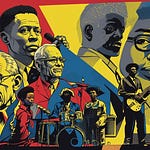I’ve come to a deeply unsettling realization about the state of reggae music production today—one that many seem to either overlook or willfully ignore.
As we have grown increasingly dependent on loops, MIDI files, and sample packs to build our reggae soundscapes, we’ve simultaneously drifted further from the soul of the music itself. And in that drift, we are losing something essential—something that no plugin, no preset, and no AI-assisted loop can replicate: Feeling.
Let’s be clear.
This isn’t about rejecting progress or innovation. Digital tools can empower creativity, speed up workflow, and break down barriers for young producers.
But in our race to automate and replicate, we’ve forgotten to feel.
Authentic reggae music was never just about a beat or a groove—it was a lived experience translated into sound. It was spiritual. It was communal. It was raw. It was alive.
Today’s over-reliance on loops and pre-made kits has rendered many new productions sterile and soulless.
When you remove the live element from reggae, you strip away its humanity.
You lose the subtle imperfections that made a groove swing. You miss the microdelays in a live drummer’s hi-hat, the syncopation of a bassist feeling his way through a riddim, the push and pull between musicians who breathe as one.
This obsession with sonic perfection has come at a cost.
And it’s not just audible—it’s tangible in the way modern audiences are reacting. We’re seeing real music consumers—especially those who still pay for music and concert tickets—gravitating back to catalog artists.
Why?
Because the warmth of analog recordings, the unpredictability of a live band, the nostalgic imperfections, and the lived emotion are things today’s digital-native productions often fail to deliver.
To compensate, hit producers have taken to recycling classics, regurgitating the grooves of the past to prop up new artists who can’t otherwise connect. But even then, what’s being revived is the sound, not the spirit.
And audiences can tell the difference.
It’s bleeding into the tour ecosystem as well. Where once a Toots, a Jimmy Cliff, or a Bob Marley would give you a different experience every single night, now many artists offer little more than karaoke over a backing track. A DJ set with an off-key vocalist is passed off as a concert.
It's not that there aren't exceptions—there are many—but the norm is slowly leaning in the wrong direction.
We’ve forgotten why people pay for concert tickets in the first place. It’s not just to hear their favorite song; it’s to experience it—differently, deeply, in real time.
When we say "get back to the roots of the music," we’re not calling for a return to the past. We’re calling for respect of the foundation.
The roots were always meant to support growth—but if you cut them off entirely, the whole tree dies. Roots reggae wasn’t just a genre—it was a value system. A sonic philosophy. A way of life that centered truth, community, and lived authenticity.
If the new generation of producers, artists, and engineers continue to prioritize convenience over craftsmanship, replication over expression, and automation over collaboration, then we may soon be left with music that only sounds like reggae—but doesn’t feel like it.
And at that point, we’ll have to ask ourselves: if the soul is gone, what’s really left?
Lloyd “Reggaeology” Laing is a Jamaican-born music brand strategist, producer, and cultural commentator with 20+ years in the Caribbean creative industry. As founder of the Reggaeology Newsletter, he blends industry insight with grassroots perspective to explore reggae’s evolution and the future of music. To connect with Laing visit reggaeology.com












Share this post